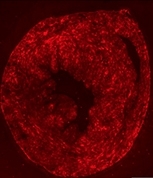A team of international researchers has discovered a way to cure cardiac disease in mice with a fatal muscle disorder that usually strikes teenagers. Two-thirds of patients with the disease, Friedreich's ataxia, die of failing hearts in their early 30s.

Mouse heart after being treated with gene therapy. The red stain demonstrates that the cells are expressing the protein frataxin, crucial to the proper functioning of mitochondria, the cells’ power plants. The therapy cures cardiac disease in mice with Friedreich’s ataxia, a fatal muscle disorder. Image: Helene Puccio
The study, published April 6 in Nature Medicine, is the result of collaboration between teams of French investigators, who led the research, and Dr. Ronald G. Crystal, chairman of genetic medicine at Weill Cornell Medical College. The therapy involves delivering a gene into heart muscle cells, and was so successful that investigators hope to eventually test it in humans, Dr. Crystal says.
"Not only did the gene therapy prevent cardiac disease in mice with Friedreich's ataxia that were destined to develop it, the treatment even reversed the disease in mice whose hearts are already affected," he says. "That was a very lovely surprise that we hope may help many, many patients.
"Of course, humans are not big mice, but we have a lot of confidence in this approach," Dr. Crystal adds. "There are no effective treatments for Friedreich's ataxia, and this treatment offers a potential solution to the aspect of the disease responsible for very early deaths."
The disorder, which affects 1 in 50,000 people in the United States and leaves them quickly wheelchair bound, is caused by a mutation in the FXN gene. The gene produces frataxin, a protein essential to the proper functioning of mitochondria, the cell's power plants. "Without functioning frataxin, the mitochondria is like a car that struggles along, perpetually running out of gas," Dr. Crystal says.
Because mitochondria are key to powering cells, those that use a lot of energy, such as the heart and nervous system, are affected. Patients who inherit a defective FXN gene first experience balance problems due to neurological disturbances (which do not affect cognition and thinking). Their hearts do not pump properly and enlarge, to lethal effect.
The researchers from INSERM (the French equivalent of the U.S. National Institutes of Health) asked Dr. Crystal to participate in the study because he and his research group have had extensive experience developing gene therapy to treat the human heart, as well as the brain. "If you succeed in implanting a gene that produces a protein in these cells, they will work for the life of these cells," Dr. Crystal says.
The scientists inserted a normal FRX gene into a virus incapable of producing disease. They used the virus to transfer the gene into the heart and found that a single dose either prevented or reversed heart disease in mice with Friedreich's ataxia.
The therapy could also be adapted to treat cardiomyopathy (enlarged heart) or other mitochondrial disorders, Dr. Crystal says.

